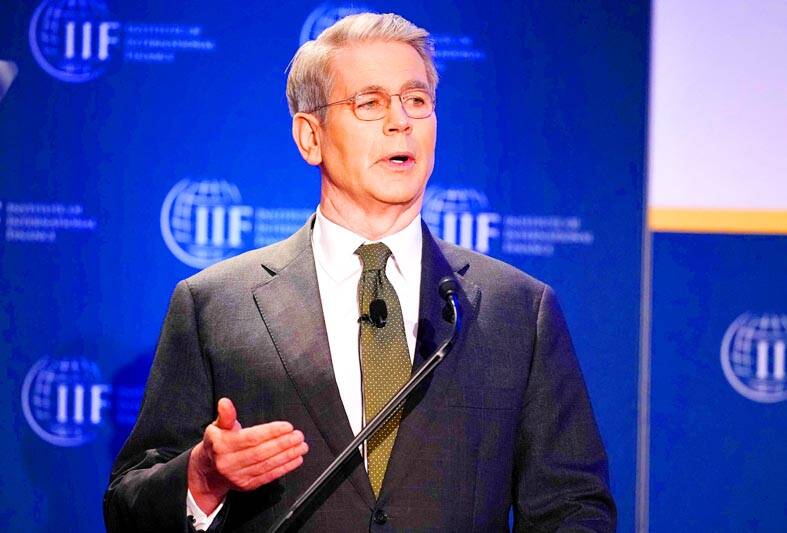US Secretary of the Treasury Scott Bessent on Wednesday said that high tariffs between the US and China are not sustainable, as US President Donald Trump’s administration signaled openness to de-escalating a trade war between the world’s two largest economies that has raised fears of recession.
The tariffs — 145 percent on Chinese products and 125 percent on US products — would have to come down before trade talks can proceed, Bessent said, but added that Trump would not make that move unilaterally.
“Neither side believes that these are sustainable levels. As I said yesterday, this is the equivalent of an embargo and a break between the two countries in trade does not suit anyone’s interest,” Bessent said.

Photo: AFP
The White House is open to discussing a significant rate cut on Chinese imports to advance negotiations with Beijing, but would not do so alone, a person familiar with the conversations said.
That person would not say how low the White House might be willing to go, but the Wall Street Journal reported the figure could be as low as 50 percent.
A White House spokesperson dismissed the reports as “pure speculation,” and said news on tariffs would come from Trump himself.
“We are going to have a fair deal with China,” Trump said, but did not outline any specifics.
The tariff levels outlined in the Wall Street Journal report would likely still be high enough to deter a significant chunk of trade between the world’s two largest economies.
German shipper Hapag-Lloyd on Wednesday said that 30 percent of its US-bound shipments from China have been canceled.
Separate talks between China and the US over tackling the fentanyl epidemic have not yielded results so far, sources said.
The apparent US softening on China tariffs was a welcome sign for markets battered by Trump’s trade policies. The benchmark S&P 500 was up 2.11 percent in midday trading, but was still more than 12 percent below its February record close.
“It’s about all of the political and policy uncertainty and what it could mean for the economy in the near term,” Plante Moran Financial Advisors chief investment officer Jim Baird said.
Bessent said the third quarter of this year is a “reasonable estimate” for achieving clarity on the ultimate level of Trump’s tariffs.
In addition to the steep tariffs on China, Trump has also imposed a blanket 10 percent tariff on all other US imports and higher duties on steel, aluminum and autos. He has suspended targeted tariffs on dozens of other countries until July 9 and floated additional industry-specific levies on pharmaceuticals and semiconductors. That has roiled financial markets and raised fears of recession.
The EU, which Trump has threatened with 20 percent tariffs, would respond with countertariffs if it cannot reach a deal with the US before the July 9 deadline, European Commissioner for Trade Valdis Dombrovskis said on Wednesday.
The 27-member trade bloc has offered to buy more liquid natural gas from the US and reduce tariffs on some goods, he added.

UNCERTAINTIES: Exports surged 34.1% and private investment grew 7.03% to outpace expectations in the first half, although US tariffs could stall momentum The Chung-Hua Institution for Economic Research (CIER, 中華經濟研究院) yesterday raised its GDP growth forecast to 3.05 percent this year on a robust first-half performance, but warned that US tariff threats and external uncertainty could stall momentum in the second half of the year. “The first half proved exceptionally strong, allowing room for optimism,” CIER president Lien Hsien-ming (連賢明) said. “But the growth momentum may slow moving forward due to US tariffs.” The tariff threat poses definite downside risks, although the scale of the impact remains unclear given the unpredictability of US President Donald Trump’s policies, Lien said. Despite the headwinds, Taiwan is likely

When Lika Megreladze was a child, life in her native western Georgian region of Guria revolved around tea. Her mother worked for decades as a scientist at the Soviet Union’s Institute of Tea and Subtropical Crops in the village of Anaseuli, Georgia, perfecting cultivation methods for a Georgian tea industry that supplied the bulk of the vast communist state’s brews. “When I was a child, this was only my mum’s workplace. Only later I realized that it was something big,” she said. Now, the institute lies abandoned. Yellowed papers are strewn around its decaying corridors, and a statue of Soviet founder Vladimir Lenin

UNIFYING OPPOSITION: Numerous companies have registered complaints over the potential levies, bringing together rival automakers in voicing their reservations US President Donald Trump is readying plans for industry-specific tariffs to kick in alongside his country-by-country duties in two weeks, ramping up his push to reshape the US’ standing in the global trading system by penalizing purchases from abroad. Administration officials could release details of Trump’s planned 50 percent duty on copper in the days before they are set to take effect on Friday next week, a person familiar with the matter said. That is the same date Trump’s “reciprocal” levies on products from more than 100 nations are slated to begin. Trump on Tuesday said that he is likely to impose tariffs

READY TO BUY: Shortly after Nvidia announced the approval, Chinese firms scrambled to order the H20 GPUs, which the company must send to the US government for approval Nvidia Corp chief executive officer Jensen Huang (黃仁勳) late on Monday said the technology giant has won approval from US President Donald Trump’s administration to sell its advanced H20 graphics processing units (GPUs) used to develop artificial intelligence (AI) to China. The news came in a company blog post late on Monday and Huang also spoke about the coup on China’s state-run China Global Television Network in remarks shown on X. “The US government has assured Nvidia that licenses will be granted, and Nvidia hopes to start deliveries soon,” the post said. “Today, I’m announcing that the US government has approved for us